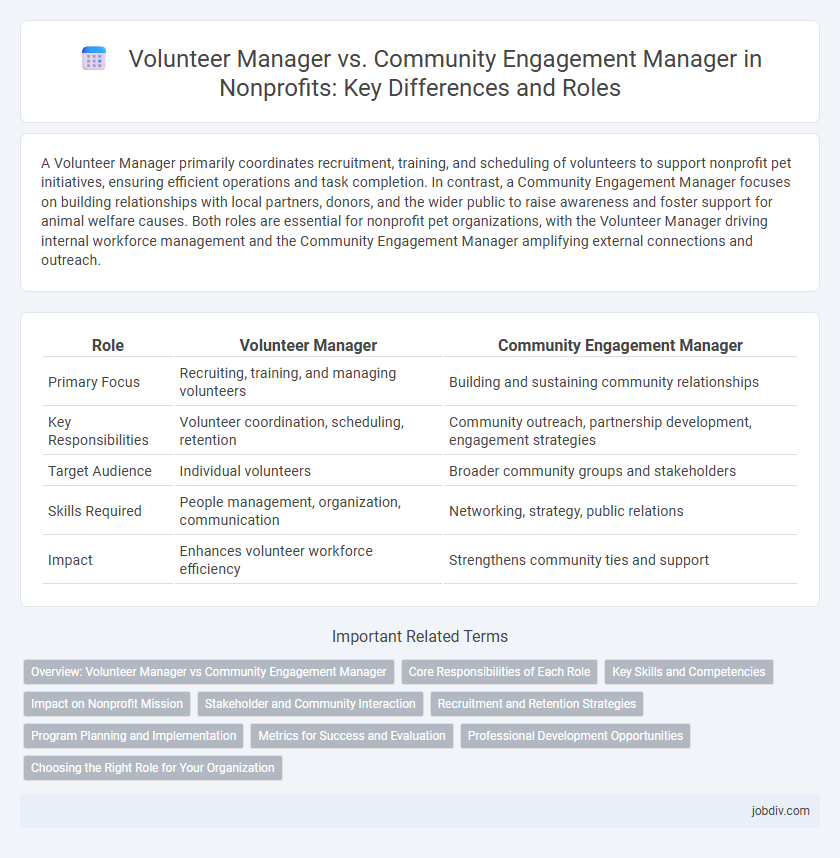A Volunteer Manager primarily coordinates recruitment, training, and scheduling of volunteers to support nonprofit pet initiatives, ensuring efficient operations and task completion. In contrast, a Community Engagement Manager focuses on building relationships with local partners, donors, and the wider public to raise awareness and foster support for animal welfare causes. Both roles are essential for nonprofit pet organizations, with the Volunteer Manager driving internal workforce management and the Community Engagement Manager amplifying external connections and outreach.
Table of Comparison
| Role | Volunteer Manager | Community Engagement Manager |
|---|---|---|
| Primary Focus | Recruiting, training, and managing volunteers | Building and sustaining community relationships |
| Key Responsibilities | Volunteer coordination, scheduling, retention | Community outreach, partnership development, engagement strategies |
| Target Audience | Individual volunteers | Broader community groups and stakeholders |
| Skills Required | People management, organization, communication | Networking, strategy, public relations |
| Impact | Enhances volunteer workforce efficiency | Strengthens community ties and support |
Overview: Volunteer Manager vs Community Engagement Manager
A Volunteer Manager oversees recruitment, training, and retention of volunteers to support nonprofit programs, ensuring alignment with organizational goals and effective volunteer utilization. A Community Engagement Manager focuses on building relationships with community stakeholders, fostering partnerships, and promoting the nonprofit's mission to enhance community support and participation. Both roles drive nonprofit impact, with Volunteer Managers concentrating on volunteer coordination and Community Engagement Managers emphasizing broader community connection and advocacy.
Core Responsibilities of Each Role
Volunteer Managers primarily coordinate recruitment, training, and scheduling of volunteers, ensuring effective deployment aligned with the nonprofit's goals. Community Engagement Managers focus on building relationships, fostering partnerships, and enhancing public awareness through strategic communication and event planning. Both roles collaborate to maximize volunteer impact and strengthen community ties but emphasize distinct operational and relational functions within nonprofit organizations.
Key Skills and Competencies
Volunteer Managers excel in recruitment, training, and retention of volunteers, requiring strong organizational skills, empathy, and the ability to motivate diverse groups. Community Engagement Managers specialize in building lasting partnerships, advocacy, and strategic communication, emphasizing skills in stakeholder engagement, event planning, and data analysis. Both roles demand excellent interpersonal abilities and leadership, but Volunteer Managers focus more on operational coordination while Community Engagement Managers prioritize relationship-building and community impact.
Impact on Nonprofit Mission
Volunteer Managers coordinate recruitment, training, and retention of volunteers, directly increasing workforce capacity to support nonprofit projects. Community Engagement Managers foster relationships with diverse stakeholders, enhancing public awareness and mobilizing broader community support. Both roles drive mission impact by expanding resources and strengthening organizational connections.
Stakeholder and Community Interaction
Volunteer Managers coordinate stakeholder relationships by recruiting, training, and retaining volunteers to support organizational goals, ensuring sustained engagement and resource availability. Community Engagement Managers build deeper, strategic partnerships with diverse community stakeholders to foster collaboration, advocacy, and trust, enhancing the nonprofit's local impact and visibility. Both roles prioritize effective communication and relationship management but differ in scope, with Volunteer Managers focusing on individual involvement and Community Engagement Managers targeting broader community alliances.
Recruitment and Retention Strategies
Volunteer Managers implement targeted recruitment campaigns and tailored onboarding processes to attract diverse volunteers, while Community Engagement Managers foster ongoing relationships through inclusive events and feedback mechanisms to enhance retention. Both roles leverage data analytics to track volunteer satisfaction and participation trends, optimizing strategies accordingly. Effective collaboration between these managers ensures a comprehensive approach to sustaining volunteer involvement and strengthening community ties.
Program Planning and Implementation
Volunteer Managers specialize in recruiting, training, and coordinating volunteers to support specific nonprofit projects, ensuring efficient program execution and volunteer alignment with organizational goals. Community Engagement Managers focus on building relationships with diverse stakeholders, fostering partnerships, and designing inclusive outreach strategies to enhance community involvement and program impact. Both roles collaborate on program planning and implementation but differ in scope: Volunteer Managers emphasize volunteer operations, while Community Engagement Managers prioritize external community connections.
Metrics for Success and Evaluation
Volunteer Managers measure success through volunteer retention rates, hours contributed, and satisfaction scores, emphasizing operational efficiency and individual commitment. Community Engagement Managers evaluate metrics like event attendance, social media interactions, and community partnership growth to gauge broader public involvement and impact. Both roles rely on data-driven insights, but Volunteer Managers focus on direct volunteer activity while Community Engagement Managers track community-wide engagement and relationship-building outcomes.
Professional Development Opportunities
Volunteer Managers benefit from targeted training in volunteer coordination software and conflict resolution skills, enhancing their ability to recruit and retain committed volunteers. Community Engagement Managers often pursue professional development in public relations, social media strategy, and stakeholder communication to effectively foster community partnerships. Both roles gain from leadership workshops and certificate programs in nonprofit management to expand their impact and career growth.
Choosing the Right Role for Your Organization
Volunteer Managers coordinate recruitment, training, and retention of volunteers, ensuring effective resource allocation for nonprofit projects. Community Engagement Managers focus on building relationships with stakeholders, fostering partnerships, and promoting the organization's mission to enhance local impact. Selecting the right role depends on whether your organization needs to optimize volunteer operations or strengthen community connections for broader support.
Volunteer Manager vs Community Engagement Manager Infographic

 jobdiv.com
jobdiv.com